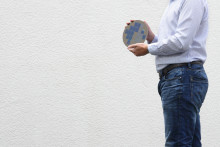‘You know, I had never been outside France before I came here’. Jonathan Barreaux was looking for a PhD position abroad to see what the world has to offer. ‘In France, PhDs are seen as students who don’t get the same benefits as regular university employees. And they have to finish within 3 years, which is a real challenge.’ Friends suggested Jonathan to consider Twente. ‘I was attracted to the openings that I found on the website, and to the conditions, too.’
The physics graduate from the University of Rennes started working on his research on the manipulation of XUV-radiations two years ago. XUV-radiations are used to identify the composition of chemicals, medication and alloys. ‘But the light easily gets absorbed and is therefore hard to reflect,’ Jonathan explains. ‘Then you lose information.’
So how not to lose information, so that other scientists can do their spectroscopies better? Jonathan: ‘I am looking for ways to maximise the resolution of the light by developing mirrors or filters. I use nanotechnology for that. I’m especially interested in certain effects that occur in crystal and not in multilayer mirrors, and vice versa.’
Time to make a change
Jonathan likes to see clearly beyond his research as well. The French PhD candidate is the president of the PhD Network of the University of Twente (P-NUT) since January. He felt that now is the time to make some internal changes. ‘Many former board members are finishing their dissertations and are leaving P-NUT.’ According to Jonathan, this is a perfect chance to professionalize. ‘P-NUT started really small, but is now officially registered at the Chamber of Commerce and has grown to the point that we need a more structured board and a better website.’
The president is especially focused on communicating unambiguously about what can and cannot be done. About housing, for example. ‘By far, most of the questions we receive concern housing. We strongly propose to get information about housing possibilities to international PhDs before they arrive.’ However, Jonathan acknowledges that this is a task of the housing corporations and international office. ‘We don’t have the knowledge or right to tell incoming people what to do. But we do emphasize this in the conversations we have with stakeholders.’
PhD charter visions
One of those stakeholders is Twente Graduate School. ‘We’re very happy with the current collaboration with TGS. We have open discussions about the PhD charter, for example.’ The charter obliges PhDs to obtain 30 ECTS next to delivering a dissertation. However, some PhDs have a larger teaching load than others. ‘Can you use teaching time to get credits?’ Jonathan asks. ‘We want a clear vision on this.’
Finally, Jonathan would like to see more Dutch PhDs in P-NUT. ‘For long, we’ve organized sessions about tax regulations or something that are primarily interesting to international peers. We plan to organize more events that are appealing to PhDs as a whole, including the Dutch ones.’







